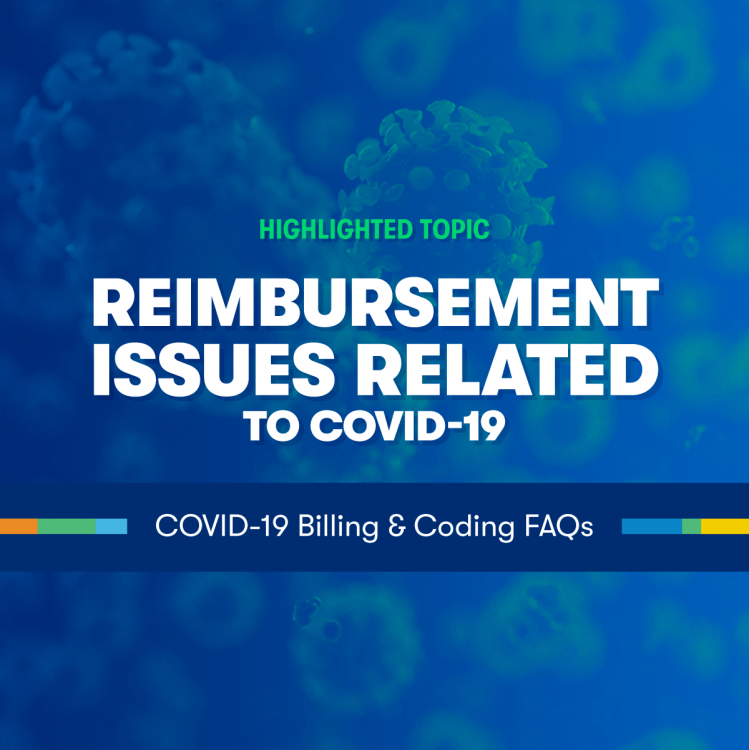

As coding and billing regulations continuously change, the content of this article may not be the most up-to-date information and is not intended to take the place of either the written policies or regulations. We encourage participants to review the specific regulations and other interpretive materials as necessary.
We've collected all the most asked COVID-19 billing questions from those that use our chargemaster and knowledge solutions, and from attendees of past webinars. We then categorized them to make answers easier to find. In this article, we'll cover FAQs around COVID-19 reimbursement issues.
CMS has not released national pricing for CPT® code 87635, Infectious agent detection by nucleic acid (DNA or RNA); severe acute respiratory syndrome coronavirus 2 (SARS-CoV-2) (Coronavirus disease [COVID-19], amplified probe technique, under the clinical lab fee schedule. However, several commercial payors, including UHC, Aetna, and Blue Cross, have announced that reimbursement for 87635 will be equivalent to the reimbursement rate for HCPCS code U0002, 2019-nCoV Coronavirus, SARS-CoV-2/2019-nCoV (COVID-19), any technique, multiple types or subtypes (includes all targets), non-CDC, which is currently $51.31 or $51.33 depending upon region. (03/25/2020)
While there is no additional reimbursement available for medications used to treat COVID-19 infections, there is a 20 percent increase in the weighting factor of the assigned Diagnosis-Related Group (DRG) for individuals diagnosed with COVID-19 who are discharged during the COVID-19 Public Health Emergency period. Accounts that qualify for the 20 percent increase will be identified and automatically adjusted by the Medicare Administrative Contractors (MACs) based upon diagnosis codes assigned to the accounts. Accounts that have diagnosis code B97.29, Other coronavirus as the cause of diseases classified elsewhere, assigned will be automatically adjusted for discharges occurring on or after January 27, 2020 and on or before March 31, 2020. The assignment of diagnosis code U07.1, COVID-19, will trigger an automatic increase in the DRG weighting factor for discharges occurring on or after April 1, 2020, through the end of the public health emergency.1 Additionally, Medicare will base outlier reimbursement on the entire cost of the stay for Medicare beneficiaries with COVID-19, even if the patient no longer meets criteria for acute inpatient care but needs to remain isolated in order to avoid infecting other individuals.2 (04/23/2020)
2COVID-19 Frequently Asked Questions (FAQs) on Medicare Fee-for-Service (FFS) Billing, page 9
The COVID-19 Public Health Emergency should not require any changes in your facility’s handling of drugs that are considered to be usually self-administered. For inpatient accounts, the revenue code 025x -Pharmacy should be used, and the drugs would be included in the DRG payment. For outpatient accounts, you should follow your facility’s established policy and procedure for self-administered drugs. (04/23/2020)
No, the 20% MS-DRG adjustment does not apply to CAHs. The adjustment applies to facilities reimbursed under the Inpatient Prospective Payment System.[1]
(08/27/2020)
The Centers for Medicare & Medicaid Services (CMS) has stated that facilities will need to let their Medicare Administrative Contractor (MAC) know that the documentation for the positive COVID-19 test is not available and the claim is not eligible for the 20 percent increase in Medicare Severity-Diagnosis Related Grouping (MS-DRG) reimbursement. To notify your MAC when there is no evidence of a positive laboratory test documented in the patient’s medical record, enter a Billing Note NTE02 “No Pos Test” on the electronic claim 837I or a remark of “No Pos Test” on a paper claim”[1]
(08/27/2020)